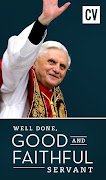This would come under the heading of "Any excuse is better than no excuse at all" or "People only hear what they want to hear".
Protest ahead of Pope's lecture at Rome university
Some professors and students are protesting against plans for Pope Benedict to address Rome's most prestigious university, saying a speech he made nearly two decades ago showed he had reactionary views on science.
The German-born Pope is due to speak at La Sapienza on Thursday at a ceremony opening the 2008 academic year. The inaugural event's theme is the death penalty, which the Vatican and the Italian state want abolished globally.
But more than 60 professors have written a letter saying the invitation should be withdrawn because the Pope's views "offend and humiliate us."
They pointed to a speech he made in 1990, saying it showed he favored the Church's heresy trial against Galileo in 1633 for teaching that the Earth revolved around the sun.
That clashed with the Bible, which read: "God fixed the earth upon its foundation, not to be moved forever."
The Pope's supporters say the speech by the pontiff, then-Cardinal Joseph Ratzinger, only quoted an Austrian philosopher saying the Galileo trial was "rational and just" and did not reflect his own views.
"He expressed a different position, distancing himself from that belief and absolutely not adopting it as his own," wrote conservative newspaper Il Giornale, after republishing a transcript of the speech.
Still, some students have seized upon the controversy to launch protests against the Church, with one group declaring an "anti-clerical" week, and preparing protest banners.
"There have been a few protests and moves (at La Sapienza) with tones of censorship," lamented Vatican Radio on its website: www.radiovaticana.org.
The protest has put La Sapienza's chancellor on the defensive, and prompted a genetics professor to come out on Vatican radio on Monday to denounce the "shameful" protests.
"I would invite him a hundred times," Renato Guarini, the chancellor of La Sapienza, told Italian state television.
La Sapienza was founded by a pope in 1303, and Guarini noted that this would hardly be the first time a pontiff has addressed an Italian university.
Benedict's supporters have noted that the Galileo controversy itself was long over. The late Pope John Paul II acknowledged in 1992 the Church was wrong to have condemned the revolutionary Italian scientist.
The controversy has added to a fierce debate about the power of the Catholic Church in Italy, which even divides the Catholics-to-Communist coalition government.
(Writing by Phil Stewart)
Monday, January 14, 2008
Subscribe to:
Post Comments (Atom)




1 comment:
your title says it all!
Post a Comment